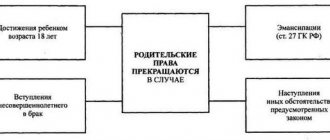The end of a marriage relationship is commonplace in modern society. The reasons for divorce are varied, many of them are associated with betrayal or indifference in the family. That is why, in most cases, women try to remove memories by changing their surname, eliminate unpleasant emotions from life and start over with a clean slate. As for children, in most outcomes of events they remain with their mother, and this leads to the need to also change their surname. If the procedure for an adult is ordinary, then for children under 14 years of age and older there are a number of features.
How to change a child's last name without the father's consent?
What is important to know?
In order to implement their plans without the father’s permission, mothers need to find a significant reason that should be put down on paper. The issue is considered by the guardianship authority where the application is submitted. The review period is at least a month, so patience is often required. If the reason turns out to be fundamental, only then is permission given to correct the surname.
If the guardian pays child support and visits the child, then taking into account the opinion of the former significant other is considered mandatory. Disputes are resolved only through the relevant service through an administrative procedure.
Note ! Such issues are practically not considered in court, only isolated cases that are of a property nature.
To change a child's surname, you need to have a good reason
What is written in the law?
Questions regarding the procedure and possibilities without the consent of the former spouse are regulated by Federal Law No. 143 of 1997. Specifics on the issue are located in Chapter 7 (Articles 58-63). The guardianship authorities have the right to grant or deny based on the application of one of the guardians. When a woman lives with her baby and wants to change her last name, she has the right to contact specialists on the appropriate form at the registry office. If the father does not appear on the birth certificate, the father's opinion is not taken into account.
For correct submission, it is necessary to study Article 59 of the above-mentioned legislative act. The section presents norms regulating the main positions in terms of the content of forms and documents.
Note ! The issue of state registration of changes is regulated by Article 60. The procedure may be refused if the package of documents is incomplete, errors or if they are lost.
Article 59 of Federal Law No. 143
Minor child
Until the age of 14, only a guardian or parent can submit an application. The document must indicate the reason why the opinion of the other parent should not be taken into account. As noted above, the reasons must be significant and supported by written information. Upon reaching the age of 16-18 years, a minor has the opportunity to independently carry out all the nuances and satisfy the needs for adjusting the surname.
A child aged 16 has the right to change his last name if he wishes.
Note ! In the presented case, the father’s permission is not needed provided he is distant from the child or evades the responsibilities of a parent. In turn, the guardianship authority checks the information and takes into account the interests of the children and the documents provided. A change at the age of 14 is also carried out subject to the permission of both parents.
Divorce: features for a child
After the parents divorce, the children retain the last name as recorded on the birth certificate. The nuances regarding the change are prescribed and worked out in the context of the statement of claim. It is especially important to submit the presented parties for consideration provided that there is no action by the father in terms of upbringing or loss of parental rights. In such a situation, you need to contact the registry office to work out the issue administratively. Another reason for the change is the presence of the second parent in places of serving a sentence for a serious crime.
Note ! The circumstances presented should be stated in the appeal.
Where to apply?
Guardianship will require all documentation on the basis of which it can be concluded that the father’s participation in resolving this issue is not necessary. Such papers include acts from the court, other documentation confirming that the mother made attempts to draw the father’s attention to the need to raise the baby.
If you have decided to change your last name, you must visit the guardianship authorities. Having received a positive decision on your issue there, you need to go to the registry office with permission from the guardianship and formalize everything by submitting an application. This document is usually accompanied by:
- mother's passport
- marriage certificate or divorce document,
- birth certificate.
Sample application
In this case, it is necessary to pay a state fee, which will be 350 rubles. This is how much it costs to produce a new document confirming birth.
Parents were not married
A registered marriage is not considered a significant obstacle to carrying out the necessary actions. The basis for the implementation of the procedure is proof of the absence of the need to take into account the spouse (non-payment of alimony, loss of legal capacity). It is important to understand: the presence of a different opinion on the part of the father is not considered an indicator of making a positive/negative decision.
You can ignore the father’s opinion if he is not involved in raising the child
A minor over the age of 16 can independently submit an application or ask to change his surname. The document is drawn up similarly to the technology described above on the basis of legislation.
Note ! The official guardian can fulfill the child's wishes. The “child” category includes all citizens of the Russian Federation under the age of 18.
Instructions for mothers after divorce
The initial stage involves submitting documents to the state guardianship agency. The latter is obliged to provide permission to implement the adjustment. To do this, a statement is written from two adults, including from the father, who lives away from his former family, regardless of the situation. An alternative solution may be a notarized consent, which is sent by mail.
Note ! As soon as the required government document is received, you should submit the documents to the registry office. Upon reaching the age of 10, you must obtain permission from the child.
You need to submit documents to the registry office for the procedure
At the registry office, to register and obtain the relevant document, you will need:
- fill out an application (each institution has its own form);
- passport or identity document;
- birth certificate and document confirming divorce;
- permission from the state guardianship agency in writing;
- receipt or receipt confirming payment of the duty.
After submitting documents to the registry office, you should be patient and wait a month. If all documentation is correctly collected and provided, then there will be no problems. The surname will be changed and the parent will be provided with a new certificate. The father's consent is not required if the child is born without entering into a marital relationship, when information from the mother's words is entered into the main columns.
Note ! The procedure is also available if there is no information about the spouse.
If a child is being raised by a single mother, the father's permission is not needed
Upon reaching the age of 14 and before reaching adulthood, the procedure changes provided:
- presence of parental compromise;
- written consent of the minor;
- guardianship permission, special document.
It is allowed to change information when dividing children only in court with the filing of an additional statement of claim.
How does a child under 14 years old change their surname when receiving a passport?
A parent raising a minor has the right to determine his first name, patronymic and choose his last name. However, making changes later is not so easy. Guardianship permission is mandatory if the child is under 10 years of age. It is obtained from the department at the administration of the district to which the minor citizen belongs.
An application addressed to the head of the guardianship department is written in any form, but subject to certain rules. The application must indicate:
- In whose name the appeal is submitted (information about the head of the municipality or the head of the guardianship department).
- Information about parents and adoptive parents (full name, information from passport, birth, contact information).
- Information about a minor citizen with date of birth.
- Grounds for appeal.
- Having the consent of the second parent.
The document is accepted for consideration if it has a date and signature. The time frame for making a decision is determined in accordance with the established regulations of a particular body.
After receiving the written notification, it is attached to other documentation and submitted to the registry office for re-issuance of the birth certificate.
If a child has reached the age of 10, he has new powers. The child can express his opinion about the decisions made by his parents regarding himself. Changing the first or last name at the age of 10-14 years is possible only with written consent from him. Moreover, it is necessary to ensure the presence of a minor when submitting an application to the registry office.
When every citizen turns 14 years old, he receives his first passport, where he enters personal information, including his full name. Parents and their child can apply to the registry office, bypassing the guardianship authority. Since a minor citizen does not have the status of legal capacity, he does not have the right to act in circumvention of his parents, adoptive parents, and trustees.
When is the guardian's consent not required?
The desire to change a child’s surname arises when family relationships end. In this case, the children live with one of the parents and, despite the disproportionate attention and responsibility, within the framework of family law, a compromise solution is required to resolve important issues in relation to the child. To remove legal inconveniences, it is necessary to understand the list of exceptions when consent is not necessary when changing the full name. These fundamental circumstances are reflected in paragraph 2 of article 59 of the Russian Family Code.
Article 59 of the RF IC
Let us list such circumstances.
| Circumstance | Description |
| Inability to establish the location of the parent of a minor child | The legislature allows the procedure to be performed without obtaining appropriate consent. The presented method is considered ideal if the former significant other does not live by registration. There are also pitfalls when relatives live in the apartment and are able to convey information directly to the father. When declaring the latter, difficulties arise with refusal. |
| Deprivation of parental rights | Another way to carry out the procedure without involving a second party. The process is extremely simple, a woman submits an application, after which she receives the desired result. |
| Declaration of dad's incompetence | This category includes people with mental disorders and physical disabilities. Limitation of legal capacity is also carried out by the court, but in this context the clause does not work for the issue under consideration. Incapacity is considered in court in relation to property rights, not civil rights. |
| Avoidance of raising children without good reason | Financial support for the child should be added to this category, which is considered an important addition. It is almost impossible to prove the absence of financial assistance, so lawyers always note the need to establish financial relations (payment of alimony) at the time of divorce. A prerequisite is the storage of payment documents confirming or refuting payments. There are also pitfalls that are associated with transferring money to the mother in kind or in cash, purchasing food, clothing and toys. In the question regarding evasion of obligations, there is also the possibility of changing the surname. But there are significant difficulties in collecting and presenting evidence to the court. If a man disputes such points, the circumstances are examined by a specialized commission. Practice demonstrates the fact that it is not always possible to prove the fact of a parent’s participation in raising a child. |
| The birth of a baby outside of marriage - when the father is essentially absent | This will allow you to change the child’s surname without unnecessary difficulties or the need for the consent of the ex-spouse. If the baby was born in an extramarital relationship, and the certificate contains information only from the words of the mother, she is classified as a “single mother”. To change your last name, you will need to contact the guardianship authority in writing. If paternity is established, but the birth was out of wedlock, it will sometimes be necessary to file a claim in court for non-recognition of established guardianship. |
There are certain circumstances when you can change a child's last name without the father's consent.
Note ! In all other cases, compliance with the general rules is required: consent of the parents, the minor upon reaching the age of ten, a document from the relevant authorities.
Official website of the Supreme Court of the Russian Federation
The Supreme Court of the Russian Federation called for protecting the interests of children from parental arbitrariness, including from the groundless desire to change a child’s first name, patronymic or last name: children should not become hostages of conflicting relationships between parents, and courts should carefully study the arguments about the need to change personal data when allowing such a measure only for the benefit of the children themselves, and not just the wishes of their relatives.
The essence of the matter
A dispute between former spouses from Krasnodar over the names, patronymics and surnames of their common children has reached the highest court. The mother insisted on changing her personal data, justifying her request by the fact that she was in a difficult, conflict-ridden relationship with her ex-husband, he caused scandals in the presence of children, and allowed assault.
The applicant argued that the father is not interested in and does not participate in the life, maintenance and upbringing of the children. At the same time, according to the case materials, alimony was recovered from the ex-husband in favor of the children, and also, by a court decision, he is obliged to buy medicine for the children, pay for an agreement with a speech therapist and speech pathologist for classes with his daughter, pay for the children’s visit to the pool, and compensate the plaintiff for the costs of purchasing seasonal orthopedic equipment. shoes for my daughter and once a year pay for a trip for children to a sanatorium recommended by the attending physician.
Nevertheless, the plaintiff indicated that the children do not want to communicate with their father, and in society introduce themselves by their mother’s last name. In connection with this, the applicant asked to allow the children to bear her patronymic and surname, and since her son was called by a different name within the family, to change that too. In addition, she insisted on changing her daughter's middle name.
The Leninsky District Court of Krasnodar partially satisfied the demands, changing the children's surnames and the son's name. The Krasnodar Regional Court left this decision unchanged.
Position of the Armed Forces
The Family Code protects children from abuse by parents (clause 2 of Article 56 of the RF IC), reminds the RF Armed Forces. He points out that Russian legislation provides for the possibility of changing the first or last name of a minor child, but in accordance with paragraph 1 of Article 59 of the RF IC, this is done at the joint request of the parents.
If the parents live separately, the guardianship and trusteeship authority resolves the issue of changing personal data depending on the interests of the child and taking into account the opinion of the other parent, the Supreme Court clarifies.
Taking into account the parent’s opinion is not necessary if it is impossible to establish his whereabouts, deprivation of his parental rights, recognition as incompetent, as well as in cases of parental evasion without good reason from raising and maintaining the child (clause 2 of Article 58 of the RF IC).
The Supreme Court explains that, within the meaning of these rules of law, changing a child’s surname based on the application of one of the parents without taking into account the opinion of the other is possible only in cases provided for by law:
- if it is impossible to establish the location of the parent, which is confirmed by a certificate from the internal affairs bodies about the search for the citizen, - if his parental rights are deprived - on the basis of a court decision, - if he is declared incompetent - on the basis of a court decision, - in cases of parental evasion without good reason from the upbringing and maintenance of the child, which can be confirmed by statements about the search for the alimony payer, documents from internal affairs bodies on the initiation of a criminal case for malicious evasion of alimony payments, a court verdict in such a case and other evidence.
“Thus, taking into account the opinion of the second parent is mandatory, and in order to overcome his objection to changing the surname and first name of a minor child, it is necessary to bring forward such arguments that will indicate the need to carry out these actions in the interests of children who, by virtue of paragraph 1 of Article 3 of the Convention on the Rights the child is given priority attention,” notes the Supreme Court.
Don't take my word for it
The Supreme Court believes that the Krasnodar courts treated the case one-sidedly, unconditionally believing the mother’s statements and supporting her position.
Meanwhile, as can be seen from the case materials, the father, contrary to the plaintiff’s words, bears the burden of supporting his children, pays monthly alimony, and also compensates for additional expenses for treatment, recreation and education of the children. The defendant’s place of residence is known, he has not been deprived of parental rights, and has not been declared legally incompetent.
In addition, after the actual termination of family relations, the father continued to be interested in the children, their health, and provided financial assistance, as follows from the decision of the magistrate, which contains a reference to the prejudicial decision of the district court, confirming this fact.
Moreover, the courts did not take into account that the mother herself was brought to administrative responsibility for failure to comply with a court decision on the order of communication between minor children and their father.
In addition, the Administration's Department for Family and Childhood Affairs received a signal from the head physician that the plaintiff behaved aggressively in the hospital both towards her ex-husband and towards the doctors, and with her behavior frightened the children and brought them to tears. According to doctors and psychologists at the institution where children undergo rehabilitation, such living conditions for children negatively affect the results of their treatment and raise concerns about the mother’s compliance with the interests of the children, and not her own.
Meanwhile, the courts did not take into account all these facts, but only believed the applicant’s words that changing the children’s surname and patronymic would help them cope with the psychological crisis. Although the defendant indicated that the intention to change the personal data of the children was caused by the applicant’s personal relationship with her ex-husband, her desire was related to the conflictual relationship between them.
As for the examination underlying the decision, it does not contain an answer to the question about the advisability of changing the children’s surname. At the same time, the conclusion states that the son and daughter of the participants in the dispute, due to their age, cannot develop any attitude towards changing their surname, patronymic, or first name, therefore they completely adopt the position of the mother, relying on her opinion. Children are not able to consciously make a choice in favor of changing their last name, first name, patronymic, and even more so to predict the consequences of this choice, experts pointed out.
Under such circumstances, the court’s conclusion that satisfying the mother’s claims is aimed at ensuring the interests of minor children is premature and was made without taking into account all legally significant circumstances in the case, the Supreme Court believes.
He finds that the violations of substantive and procedural law committed by the court of first and appellate instances are significant, and therefore canceled their decisions and sent the issue of changing the surname of the children for a new consideration.
Alice Fox
How to change your last name without your father's intervention?
The procedure for carrying out the process without the consent of one of the parents is similar to that described above. As noted earlier, the reasons for performing the procedure without the written permission of the father are in the absence of information about his whereabouts, in the event of deprivation of paternity rights or evasion of the parenting procedure, the fulfillment of financial obligations to the child, as well as in the case of the birth of a child who is not married.
The key nuance on which the outcome of the result of a state body depends can change: the court’s decision on the issue of declaring the second parent incompetent; a certificate indicating the debt for alimony payments; a document indicating the impossibility of establishing the whereabouts of the guardian.
To be able to change your last name, you must have a court decision
How to change middle name?
Another point when changing a surname is associated with the patronymic. Some wives try to completely rid themselves of memories, but in the process presented, the requirements are more stringent. You can exercise this right if one of the following conditions is met:
- the father is deprived of parental rights;
- the father is not listed on the birth certificate;
- information about the father was entered based on data from the mother’s words;
- the father challenged paternity based on DNA testing.
In other cases, a change of patronymic is not possible until the age of 18. The procedure will require legal proceedings and only under exceptional circumstances.
Note ! After 18 years of age, the child has the right to demand any changes. In the presented version, the consent of parents and guardianship authorities is not required.
In some cases, you can change your middle name
How to submit consent to change the surname of a minor child, an example for 2021
The consent form for changing the child’s personal data will be attached for review. We will look at its structure:
- A cap.
- Document's name.
- Text containing the request and reason.
- Date of.
- Signature + transcript.
Download a sample consent form for changing a child’s personal data
Required information:
- Applicant's personal information. This is full name + date and place of birth + citizenship and nationality + place of residence + marital status.
- Information for a minor: - Full name + date of birth + place of birth.
- Details of records of specific acts from the registry office that were made to the applicant/his child under 18 years of age.
- New data: last name, first name and + (or) middle name, as chosen by the interested person.
- Description of the reason that becomes the basis for such a change (divorce, adoption).
- Signature + transcript of the applicant.
- Date of.
If it is not possible to submit the agreement in person, contact a notary to certify this intention. Without the appropriate visa, you will not receive approval from the guardianship authorities.
The application must be accompanied by documents that certify:
- applicant's identity (passport);
- child's identity (certificate);
- dissolution of relationship;
- registration of a new marriage;
- consent of the interested person from 10 years;
- fact of registration of the applicant (form No. 9);
- education of a minor (certificate from the educational institution).
See the sample for what a minor’s consent to change his personal data looks like.
Sequence of actions when changing the name of a daughter or son
The exceptions that provide for changing a surname without consent are described above. If a change is required with the consent of the father, then you need to go through a standard procedure, which involves:
- determining the list of documents for obtaining permission from the state guardianship authority;
- providing documents and waiting for the time to receive a refusal or permission;
- preparing documents for submitting an application to the registry office and then waiting for the result;
- since the procedure is considered a public service, payment of a state fee is required for amending the relevant acts;
- obtaining documents confirming the change of name, surname or patronymic.
You need to pay a state fee for this procedure
Note ! The sequence can be adjusted subject to amendments to legislative acts or if there are nuances in government bodies.
Basic provisions for changing the surname and patronymic of a minor
The main provisions for changing a child’s surname are determined by the provisions of Art. 59 of the RF IC, but much will depend on the consent of the father and the age of the ward. There are 3 age groups among minors whose parents or one of the parents decided to change the data:
- Until the 10th anniversary.
- Over 10 years of age before receiving a passport.
- Over 14 years of age until reaching adulthood.
After a citizen turns 18, he has the right, on his own initiative and without asking permission from his parents, to contact the registry office to make changes to his passport. Such an easy procedure in adulthood is not so simple when it comes to minors.
The law sets restrictions for them:
- only the name changes at the request of the parent;
- changing the surname involves only choosing from 2 options - by father or mother;
- A change of patronymic is not expected unless there are compelling reasons for this.
Based on the legislation, the easiest process is provided for when you intend to change your name. Since it is possible to change a child's surname by choosing one of the parents' surnames, there must be exceptional circumstances to obtain completely new data.
Is it possible to change a child's middle name?
The issue of changing a child’s middle name is even more difficult to resolve, since it essentially reflects information about a possible father. Changing a child’s middle name is a serious step and is only possible with real changes in the life of the ward:
- When officially identifying the child’s father in court and re-issuing personal documents for a minor.
- Through adoption, there is a reason to change the data with reference to the adoptive parent.
Even if the mother came up with a middle name without having a specific person in mind, there can be no other grounds for changing the middle name. The father's consent or his renunciation of paternity is not enough - the mother will need a document establishing the grounds for changes in the personal information of the ward.
Contacting the guardianship authorities
It should be remembered that it is the guardianship authority that issues permission to correct the name. Certain points are adjusted in accordance with Article 6 of the Federal Law “On Guardianship and Trusteeship”. Changes are made at the place of residence with a guardian. The document does not contain information regarding age restrictions for changing a surname, so permission can be obtained at any time.
The application is carried out in several ways, which includes a personal visit, sending an application by mail or through an official representative with a power of attorney. All documents submitted by the applicant are recorded in a journal, and a copy of the application with an acceptance mark is issued. A decision will be made based on the documents.
Note ! There are no uniform deadlines for the procedure; each issue is considered individually.
You may need to contact the guardianship authorities
Is it possible to change a child's surname without the father's consent?
The basis for changing a child's surname is the mutual consent of both parents. However, there are exceptions in which the consent of the second parent is not required. So, in paragraph 2 of Art. 59 of the RF IC considers the circumstances in which the father’s opinion on changing the child’s surname is not taken into account:
- there is official legal confirmation of the father’s incapacity;
- he evades paying alimony;
- declared missing or there is no information about his whereabouts;
- the father is deprived of parental rights;
- ignoring your parental responsibilities;
- the child was born out of wedlock.
To apply for a change of surname without the consent of the father, documentary evidence of each circumstance must be attached for which his vote is not taken into account.
Father's incapacity
Only a court has the right to recognize a person as legally incompetent, if there is a medical report from the MSEC or a forensic psychiatric commission. Copies of these documents are submitted along with the application to change the surname.
Evasion of alimony payments
A willful defaulter of alimony is considered to be a citizen who has not made payments for more than 6 months. But, this fact must be recognized in court in order to be able to ignore the father’s voice when changing the surname.
Lack of information about the whereabouts of the father
In this case, the applicant must obtain a police certificate confirming that the father does not live at his registration address and put him on the wanted list. The guardianship and trusteeship authorities very carefully check this issue and ask for evidence that the whereabouts of the child’s father is not possible. For confirmation, it will be sufficient to have a court decision declaring the father missing or a search statement.
Avoidance of parental responsibilities
This situation is considered when the father, for no apparent reason, does not take part in raising the child. This can also be attributed to the father’s refusal to pay child support, since the financial support of the child is the main responsibility of the parents.
Father deprived of parental rights
Deprivation of parental rights occurs in court. When submitting an application to change a surname without the consent of the father, it must be accompanied by a court decision on deprivation of parental rights.
Bastardy
If a child was born out of wedlock and genetic confirmation of paternity has not been made, the mother can contact the guardianship authority and obtain consent to change the child’s surname.
Required documents
There is no specific list of documents. Each case is individual; in most cases, the following are considered mandatory to provide:
- application of the established form for a name change;
- a copy of the passport indicating the child;
- birth certificate;
- certificate of divorce;
- certificate from the place of registration;
- the child’s consent to change his first or last name upon reaching the age of 10;
- court decision on deprivation of parental rights of one of the spouses or on incapacity, etc.;
- when putting on the wanted list;
- parent's death certificate.
It is necessary to provide certain documents to carry out such a procedure
This list can be expanded. As noted above, in this case there is no sufficient and comprehensive list.
Note ! That is why it is necessary to approach the issue creatively and provide the maximum package of documents for a positive outcome of events.
Registration without consent. Legal consultation
The law provides for a number of situations when a change of name is made without the consent of the father, who:
- classified as persistent defaulters;
- cannot be called a father due to complete withdrawal from the child’s life (not interested, does not educate);
- put on the wanted list;
- declared missing;
- declared incompetent;
- deprived of parental rights.
Malicious evasion. In order for there to be a compelling reason, we recognize the defendant as a willful defaulter. To do this, we write a petition to the senior bailiff, referring to Art. 157 of the Criminal Code of the Russian Federation. We enclose a certificate about the amount of debt; you can get it from the executor in charge of the proceedings.
Deprivation of parental rights. The grounds for this action are stated in Art. 69 SK. Such a measure may be prescribed for:
- failure to fulfill paternal duties, including alimony;
- refusal to pick up an offspring from a maternity hospital or medical institution in the absence of a valid justification;
- abuse of rights (forced debauchery and drinking alcohol, begging);
- harsh treatment (use of brute physical force, psychological crush);
- alcoholism, drug addiction;
- incapacity;
- intentional crime against health/life.
Attention!
You cannot force children to change their data if they are 10 years old. Only if it is voluntary.
Application for change of surname
The basis for the adjustment is considered to be a statement written in accordance with Form No. 17, approved by the Government of the Russian Federation of October 31, 1998, by Resolution No. 1274. The submitted application is the basis for making appropriate changes to the civil status act. The statement states:
- information to change;
- reasons for updating information;
- applicant's application form;
- list of attached documents.
Application on form No. 17
The form is considered the basis of the application; if you write an application in any form, you will be refused. It is advisable to pre-print several forms and fill them out at home.
Note ! This will help avoid awkward situations and communication with employees.
Required documents
Among the main documents that must be attached to the application are:
- passport;
- birth certificate;
- permission from guardianship authorities;
- receipt of payment of state duty;
- other documents that are required at the registry office.
Some nuances can always be clarified with the authority where the documents are submitted. This is where important nuances may arise that need to be worked out. It would not hurt to consult a lawyer who can help in collecting important documents for filing the appropriate appeal.
You can consult with a lawyer so that this procedure takes place without any problems.
Required documents when changing a surname for children
In the process under consideration there are two stages of action, the first is an appeal to the guardianship authorities, the second is the submission of an application to the registry office. The package of documents when changing a child’s surname without the father’s consent will vary depending on the authority and the chosen basis. In addition, given that the package of documents for guardianship is not established by law, specialists may request additional papers. The general list is as follows:
- Birth certificate of a minor.
- Application from parent/adoptive parent.
- A copy of the applicant’s passport, which contains a note indicating the presence of a child.
- Divorce certificate, if the marriage was registered.
- Certificate of residence indicating the minor.
- The child’s consent if he has reached 10 years of age. It is best to submit it in writing in free form.
- Depending on the basis: court decision on deprivation of parental rights; certificate of non-payment of alimony; witness statements; Bank statements; decision to recognize a citizen as incompetent or missing; resolution on putting on the wanted list, etc.
An application form for changing a child’s surname to the guardianship and trusteeship authorities can be
If you contact the registry office when changing your surname, a child without the consent of the father must collect the following documents provided for in Art. 59 RF IC:
- An application written in the form established by Order of the Ministry of Justice No. 201.
- The document confirming the identity of the applicant is in most cases a passport.
- Birth certificate of a minor subject to replacement.
- Permission from the guardianship and trusteeship authorities.
- Receipt for payment of state duty.
- Other documents requested by the employee.
In practice, when changing a child’s surname without the father’s consent, most often the package is limited to what was listed above, but depending on the situation, other certificates and documents may be requested.
Issuance of a new birth certificate
Based on paragraph 4 of Article 63 of the Federal Law “On Civil Status Acts,” adjustment of the last name, first name or patronymic is considered the basis for issuing a new birth certificate to a minor. The Civil Registry Office has been given a month to prepare and submit the document.
Note ! Subject to the need for additional verification or other valid reasons, the period may be extended by 2 months.
If you change your last name, first name or patronymic, a new birth certificate will be issued










